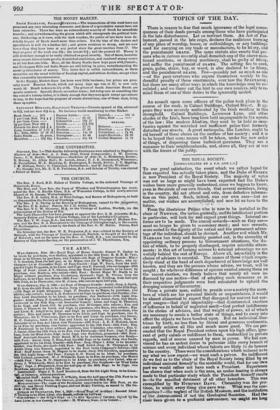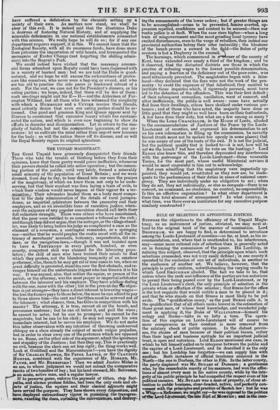THE ROYAL SOCIETY.
[COMMUNICATED BY A P.R. AND L.S.]
To our great satisfaction, the event which we rather hoped for than expected has actually taken place, and the Duke of SUSSEX is now President of the Royal Society. The majority of votes was not so large as might have been expected had the Duke's wishes been more generally understood, since we happen to know, even in the circle of our own friends, that several members, living, in the country, did not attend and vote, from defective informa- tion on this point. Snell; indeed, was our own case—but no matter, our wishes are iteceutplished;:and now let us turn to the future. e., . .
'Prom the illustrious Piitiee who lid* to be installed in the chair of NEWTON, the nation generally, andits intellectual portion in particular, will look for -and expect great things. - Internal re- forms are to be made. The annual rewards—such as they are— must no longer be given to secondary Merit; and new rewards, more suited to the dignity, of the nation and the permanent advan- tage of-the individual, should be devised. Another evil which Mr. BABBAGE has truly and forcibly pointed out, is the absurdity of appointing ordinary persons to Government situations, the du- ties of which, to be properly discharged, require scientific attain- ments: in this art of turning science to national advantage we are wofully behind the rest of Europe. Above all, impartiality in the choice of advisers is essential. The names of those which respec- tively stand at the head of each department of knowledge are well known, and they are the persons whose advice, we trust, will be sought ; for whatever difference of opinion existed among them on the recent election, we firmly believe that nearly all were in- fluenced by one motive—that of adopting such measures as in their respective judgments were best calculated to uphold the drooping science of the country. From a private man, called to preside over a society the mem- bers of which are his personal friends or acquaintance, it would be almost chimerical to expect that disregard for ancient but cor- rupt usages—that rigid impartiality—that disinterested exeition of influence in behalf of neglected merit—that perfect indifference in the choice of advisers, and that weight of power, all of which are necessary to create a better state of things, and to carry into effect the objects we have touched upon. But an individual illus- trious by birth, no less than by liberal and generous sentiments, can easily achieve all this and much more good. We are per- suaded that the Royal President enters upon his high office, igno- rant of petty cabals or indifferent to them, unshackled by private regards, and of course unawed by men in power. We feel con- vinced he has an ardent desire to patronize alike every branch of science and every individual whose talents are likely to do honour to the country. Those were the considerations which induced us to say what we now repeat—we. want such a patron. So indifferent do we feel as to the chair of the Royal Society being filled by an individual eminent himself in the Scientific *world, that for our own part-we would rather not have such :a President. - Experience has shown that-when such is the -case, an undue leasing is always made to 'that particular study which the. President himself excels into the manifest detriment of all 'other: branches. This was exemplified by -Sir HITEIPHRY DAVY. ' Chemistry was his pro- iince, to- which every thing else gave way. What was the con- leqiierice?1=the neglect of theEritish Museum, and-the institution of the A-strononiical if not the Geological Societiei. Had the chair been given to- a profound, astronomer,'we. might erelong have suffered a defalcation by the chemists setting. up a society of their own. As matters now stand, we shall be clear of this evil. It indeed said that the illustrious Duke is desirous of fostering Natural History, and of supplying the miserable deficiencies in our national establishments connected with this science. We really hope he will do so ; for if any one department requires support, it is this. We cannot learn that the Zoological Society,. with all its enormous funds, have done more than patronize the importation of wild beasts, and transported the menagerie of Exeter Change (not forgetting the shilling admis- sion) into the Regent's Park. We could indeed have wished that the necessary ceremo- nial forms attendant upon Royalty could have been dispensed with in a society of learned men : but we are told the Duke is good- natured, and we hope he will excuse the awkwirdness of profes- sors like ourselves, who never wore a bag-wig or sword, and who are too old to practise the side paces or backward retreat of a crab. For the rest, we care not for the President's dinners, or his eating parties ; we hope, indeed, that there will' be few of them: such meetings might suit Sir E— H— and the Aldermen of Far- rington Without, but all those who have witnessed the simplicity with which a HUMBOLDT and a CUVIER receive their friends, must ardently desire that even our eating parties should be re- formed. Our good and gracious King and Queen appear sent by Heaven to counteract that excessive luxury which has contami- nated the nation, and which is even now beginning to show its effects in disorder and disorganization. Let us return to the sim- plicity of habits, but not the comparative ignorance, of our an- cestors: let us cultivate the mind rather than import new luxuries for the body : so will the nation throw off its disease, and so will the Royal Society regain its original splendour.



























 Previous page
Previous page